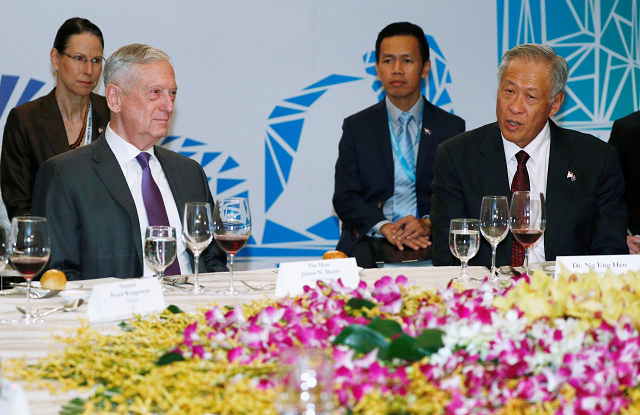US, China, others tentatively agree to multilateral air encounter code
Joining 10 Southeast Asian nations already in the pact

US Secretary of Defense James Mattis and Singapore Defence Minister Ng Eng Hen meet ASEAN defence ministers during a lunch meeting at the ASEAN Defence Ministers' Meeting in Singapore October 19, 2018. PHOTO: REUTERS
The world’s two biggest economies as well as Australia, India, Japan, New Zealand, Russia, South Korea tentatively joined the agreement, which was initially adopted on Friday by the Association of Southeast Asian Nations (ASEAN), according to a joint statement issued after a meeting of defense ministers from the 18 countries in Singapore.
US, China defence chiefs aim to improve strained ties
The voluntary, non-binding guidelines build on an existing code to manage sea encounters adopted by all 18 countries last year, which was designed to mitigate risks following a boom in the region’s maritime and air traffic in recent years.
“We all know that if there is a physical incident it changes the name of the game ... it creates a cascade of activities that you cannot control,” Singapore defense minister Ng Eng Hen, the host, said at a press briefing following the meeting.
The air code has been hailed as the first multilateral deal of its kind, although such arrangements exist at bilateral levels. The US and China, for instance, in 2015 signed a pact on a military hotline and rules governing air-to-air encounters.
US, South Korea suspend additional military exercise: Pentagon
US Defense Secretary Jim Mattis told his Chinese counterpart, Wei Fenghe, on Thursday that their countries needed to deepen high-level ties so as to navigate tension and rein in the risk of inadvertent conflict.
The US military flew B-52 bombers across the South China Sea in September. Earlier this month, a US Navy destroyer sailed near islands China claims, drawing the ire of Beijing.


















COMMENTS
Comments are moderated and generally will be posted if they are on-topic and not abusive.
For more information, please see our Comments FAQ